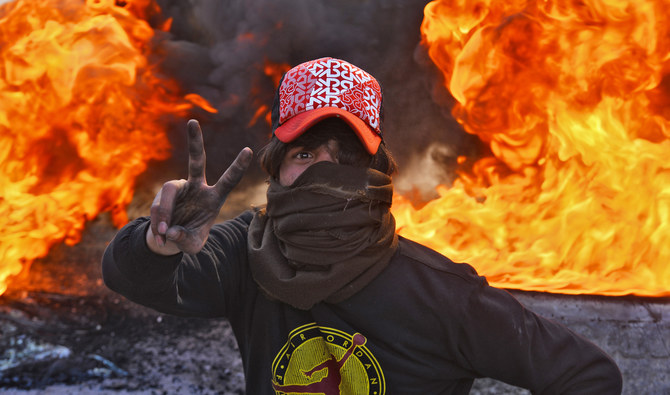
- ARAB NEWS
- 05 Jul 2025

Toward the end of last year, Arab News ran a series of opinion pieces called — in journalistic parlance — “year-enders,” which highlighted how troublesome the last decade had been. Some of the writers emphasized how the world — especially the Arab world — had been turned upside down by armed militias, how 9/11 had wreaked havoc, how rogue regimes — such as the ones in Baghdad, Damascus and Tehran — had turned on their people and on their neighborhoods, and how the world had reaped the harvest of hate that overtook much of the world. In their articles, our op-ed writers raised optimism and expressed hope that the new decade would usher in peace and a semblance of normalcy.
However, if January 2020 is any indication, it seems that the new decade is going to be one bumpy rollercoaster ride. The past 31 days have seen cataclysmic and far-reaching events.
January started with the elimination of Qassem Soleimani, the dreaded terrorist from Iran. Of course, this was good in the sense that the former leader of the Quds Force was the spearhead of Tehran’s regional destabilizing activities, and had had personal involvement in terrorist operations in Iraq, Syria and Yemen.
However, his killing has sent a clear signal that the rule of the game has changed. For once, Iran was held seriously accountable for its behavior. As welcome as this was, we must remember that we are dealing with an ideological entity that is also facing mass protests internally, so the thinking in Tehran would most likely be “if I am going down, I am taking everyone down with me.”
The first to fall as a result was Iraq. Although many would argue that what this country is going through today is a direct result of the American mismanagement of the 2003 war, which rolled out the red carpet for Iranian involvement, today we risk a complete institutional failure and a full-on surrender to the Iran-backed militias, which will inevitably crush the hopes of people protesting in the streets across Iraq.
If January 2020 is any indication, it seems that the new decade is going to be one bumpy rollercoaster ride.
Faisal J. Abbas
Another country that is suffering from Iran’s involvement is Lebanon. For over 100 days, people have protested against the corrupt system that has ruled the country for so long.
Having the most to lose, the Iran-backed Hezbollah opted to challenge the people, and as a result, the economy is teetering and citizens are not allowed access to their own bank deposits. Despite a new government in place, there is no end in sight to the crisis unleashed by people on the street. The people want a complete and total removal of the old political elite from the corridors of power. There is a crisis of faith in the ruling elite, and also in the political class. The politicians seem clueless, and all their shenanigans and infighting have so far failed to persuade the people to leave the streets and go home. What we are essentially looking at in Lebanon is one of two possible outcomes: A complete economic meltdown, or another civil war if any more blood is spilt.
For its part, Turkey too has decided to start the decade with an unwise adventure by deciding to get militarily involved in Libya. Like so many military involvements, we all know how they start, but very few can predict how they end.
A close ally of Turkey, and its key backer, is Qatar. The tiny Gulf sheikhdom seemed to come close to resolving its issues with the Anti-Terror Quartet (Saudi Arabia, the UAE, Bahrain and Egypt) toward the end of last year. But as we enter February, its seems that the leadership in Doha is adamant on continuing with the behavior that led to its isolation to start with — so no rapprochement expected anytime soon.
Then you had the US administration’s peace plan for the Israeli-Palestinian conflict. Of course, while one must acknowledge that Palestinian division and indecisiveness in the past have made a resolution much more complex, Israeli threats to illegally and forcefully annex more Arab lands will threaten regional peace further and make any prospects for peace even more remote.
Then came the epidemic from China. Many have already died from the coronavirus, and the World Health Organization has declared a global emergency. Wuhan, the city where the virus first appeared and caused panic, is in total lockdown. Flights to and from China have been canceled, and as a result, the country is suffering massive economic losses. In a highly interconnected world, these losses will have a massive but unforeseen negative effect on the world’s health and economy.
And on the last day of January, Britain came out of the EU. Brexit finally happened. Britain remains one of the most important nations of Europe and the world. Its leaving the EU will have far-reaching consequences, not only for Britain and Europe but also for the whole world. There will surely be new alignments, new treaties and new laws. Of course, while Prime Minister Boris Johnson is cheering for it, many of his own people and fellow leaders are cringing, as the obvious thing for Britain is that it seems that it will get worse before it gets any better.
What all these events in a mere one month suggest is that we are in for much turbulence before a new reality kicks in and becomes the new standard — and in such time, it is honestly a matter of survival of the fittest.
A belated happy new year everyone!